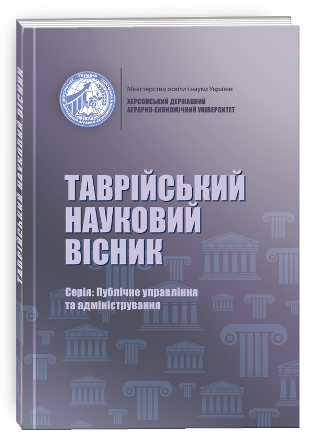ANTI-CRISIS PUBLIC GOVERNANCE AS A FACTOR OF THE DEVELOPMENT OF TRANSREGIONAL ECONOMIC COOPERATION
DOI:
https://doi.org/10.32782/tnv-pub.2023.5.8Keywords:
anti-crisis management, transregional interaction, public governance, foreign economic strategy, digital economy, security policyAbstract
The article examines the specifics of anti-crisis public-authority coordination of transregional cooperation, which requires not only organizational actions, but also effective media support in the context of transregional cooperation. The application of creative approaches and new ideas of transregional cooperation of Ukraine and foreign partners, which needs to be updated precisely in the dissemination of success cases, cooperation, as well as the base of contacts between economic subjects, has been studied. Signs of the economic development of Ukraine during the war were established, which proved the possibility of adaptability and adaptation to crisis conditions. The importance of the experience of transregional cooperation and its economic efficiency, which requires monitoring and expert opinions, have been clarified. The article uses professional methodical tools of modern sciences of public administration. Possibilities of creating a cross-border and transregional cooperation profile are being studied in order to increase its effectiveness and compensate for economic losses. The process of anti-crisis comprehension of the entire semantic and informational field of management decisions is evaluated. The factors of providing recommendations regarding the strengthening of efforts within the framework of a specific task are disclosed. Attention is paid to the institutionalization of anti-crisis management in the conditions of military operations and martial law, which is an urgent task of transforming the state-management structure of modern Ukraine. It was found out that the modern realities of the Russian-Ukrainian war proved the urgency of prompt response to crises and risks. This response is a key to the stability and effectiveness of anti-crisis governance. It was established that the introduction of new management technologies of anti-crisis management involves the transformation of all branches of government. It has been proven that in the conditions of war there is a “washout” of qualified personnel due to military operations. It was established that the state-owned companies and enterprises of Ukraine are properly motivated by military threats. The importance of plans and defined performance indicators, which complements targeted efforts to improve the quality of cross-border interaction, is revealed. It was found that the vision of the processes in their dynamics and in accordance with the actual data. It has been proved that the crucial importance of understanding, coordinating and fully informing all links regarding the statistics of the activities of enterprises and companies. It was concluded that the most important factor is the formation of a mechanism for preventing instability, and the risks are monitoring of the current situation. It is noted that anti-crisis reforms of transregional cooperation require modification of domestic structures of public governance. It has been established that the primary tasks of anti-crisis management of transregional cooperation are the unification of information on transregional economic contacts, technology transfer, investment attraction, etc.
References
Бабкін Д. О., Нікітіна О. А. Антикризове управління трудовими ресурсами. Проблеми і перспективи розвитку підприємництва. 2014. № 1. С. 18–21.
Гринько Т. В. Особливості антикризового управління підприємством в сучасних умовах. Вісник Дніпропетровського університету. Сер. : Економіка. 2014. Т. 22, вип. 8(2). С. 117–122.
Карачина Н. П., Савіцька О. О. Антикризове управління: сучасний категоріальний вимір. Економіка. Управління. Інновації. Серія : Економічні науки. 2014. № 1. URL: http://nbuv.gov.ua/UJRN/eui_2014_1_47.
Масюк В. М. Взаємозв’язок антикризового управління з ризик -менеджментом та системою економічної безпеки підприємства. Вісник Національного університету «Львівська політехніка». Менеджмент та підприємництво в Україні: етапи становлення і проблеми розвитку. 2013. № 778. С. 81–86.
Проволоцька О. М., Ясиненко Д. В. Теоретичні аспекти антикризового управління стратегічним потенціалом підприємства. Вісник Дніпропетровського університету. Сер. : Економіка. 2013. Т. 21. Вип. 7(2). С. 99–104.
Шамборовський Г. О. Застосування антикризового регулювання з метою стабілізації та зростання доходів населення в трансформаційних економіках. Економіка та держава. 2016. № 9. С. 51–55.
Bouncken R.B., Kraus S. & de Lucas Ancillo A. Management in times of crises: reflections on characteristics, avoiding pitfalls, and pathways out. Review Management Science 202216, 2035–2046. https://doi.org/10.1007/s11846-022-00580-2
Brown R., Rocha A., Cowling M. Financing entrepreneurship in times of crisis: Exploring the impact of COVID-19 on the market for entrepreneurial finance in the United Kingdom. International Small Bus Journal: Researching Entrepreneurship. 2020. 38(5): 380–390.
Camisón C., Clemente J., Camisón – Haba S. Asset tangibility, information asymmetries and intangibles as determinants of family firms leverage. Review of Managerial Science. 2022. https://doi.org/10.1007/s11846-022-00522-y.
Dosi G., Soete L. On the syndemic nature of crises: A Freeman perspective. Research Policy. 2022. 51(1): 104–393.
Hillmann J. Disciplines of organizational resilience: contributions, critiques, and future research avenues. Rev Man Science. 2021. 15(4): 879–936.
Kraus S, Clauss T, Breier M., Gast J., Zardini A., Tiberius V. The economics of COVID-19: initial empirical evidence on how family firms in five European countries cope with the corona crisis. International Journal of Entrepreneurial Behavior & Research. 2020. 26(5): 967–1092.







